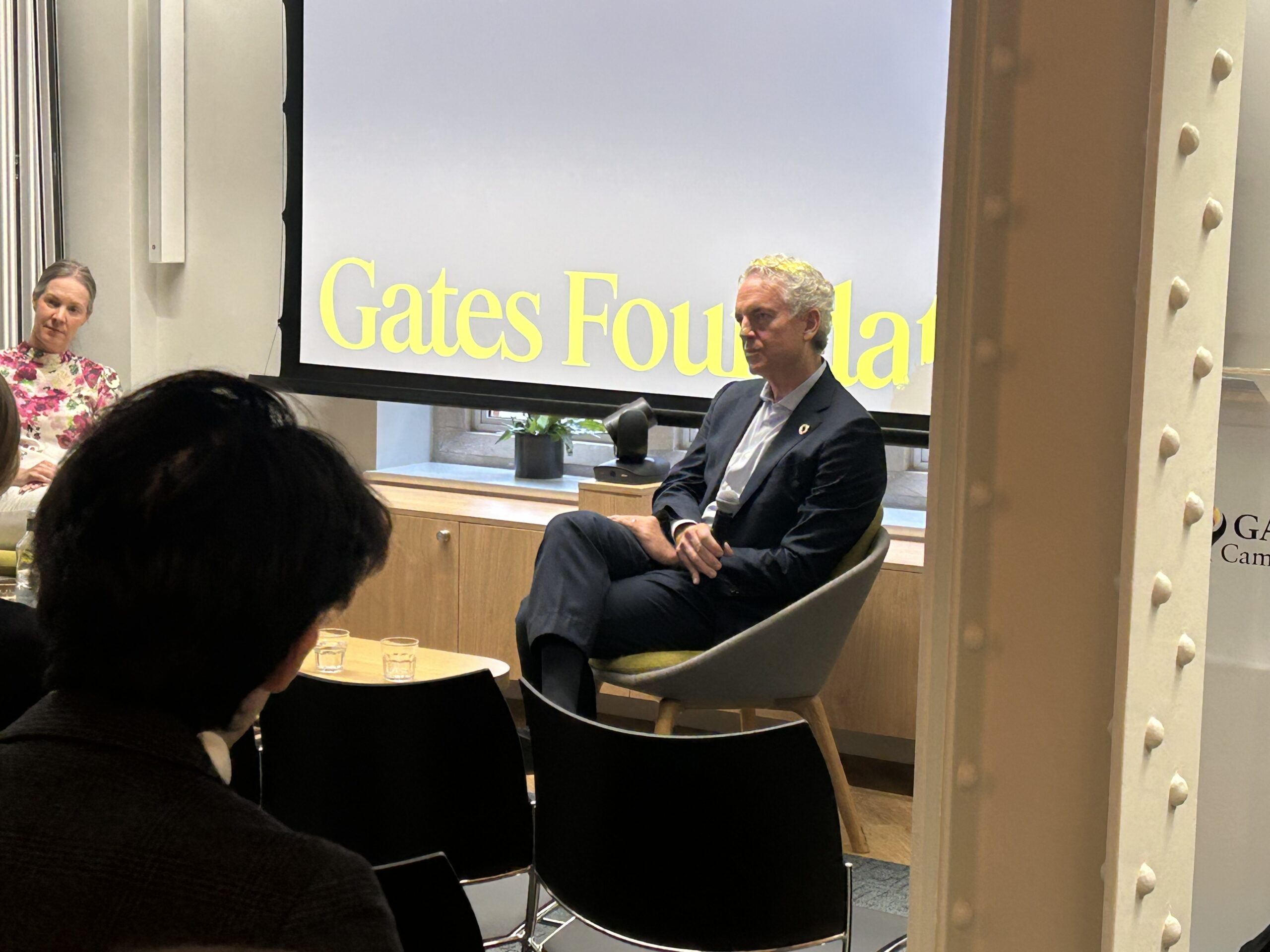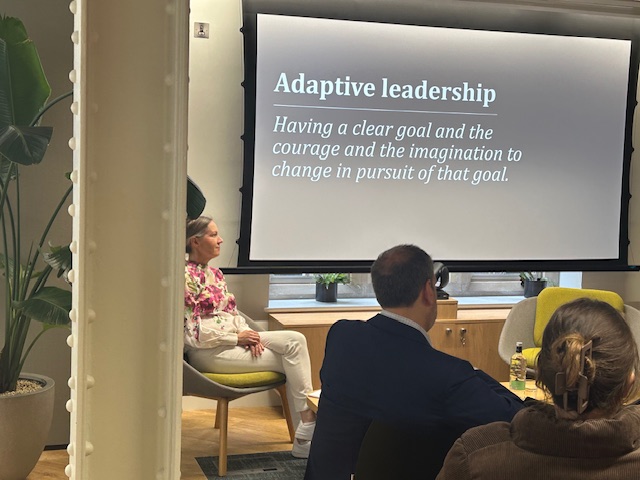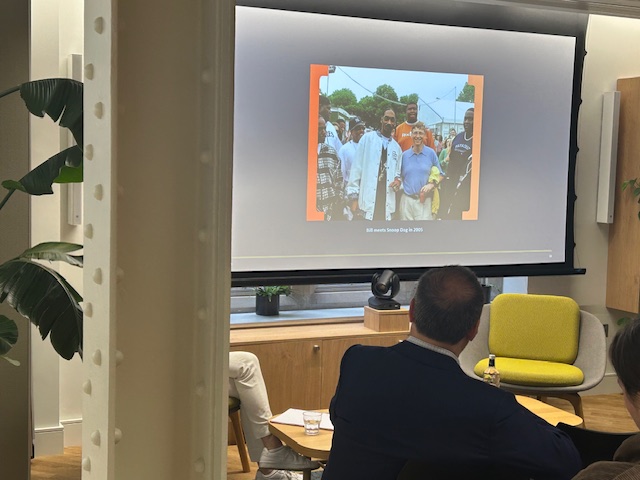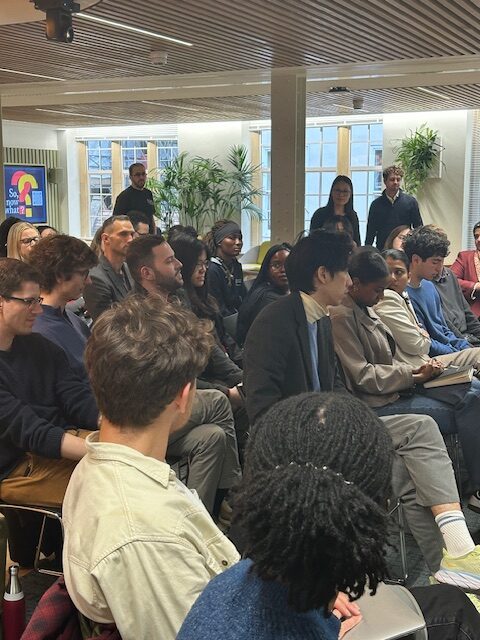
Joe Cerrell from the Gates Foundation spoke about the need to stay true to your values while adapting to a changing world at a talk at Bill Gates Sr House.
When you know what matters you can adapt without losing yourself.
Joe Cerrell
The global move against internationalism has meant organisations like the Gates Foundation have had to adapt – to change their language, to look at where technology can make efficiencies and to make better arguments, Joe Cerrell, managing director of the Gates Foundation for Europe, the Middle East, and East Asia, told Gates Cambridge Scholars at an event at Bill Gates Sr. House on Monday.
But he remains optimistic that progress can be made and that its purpose is still strong.
 Speaking about adaptive leadership in an event hosted by Professor Riikka Hofmann [2001], Cerrell talked about the positive changes he had seen since he started working at the Gates Foundation just before Gates Cambridge was launched and about all that Gates Cambridge Scholars have achieved since. He spoke of how the annual budget of the Foundation had grown nine-fold since then, how the staff fit in one conference room 25 years ago and now number more than 2,000 people in offices around the world nearer to the source of the work they are doing. “It’s been a heck of a journey,” he said.
Speaking about adaptive leadership in an event hosted by Professor Riikka Hofmann [2001], Cerrell talked about the positive changes he had seen since he started working at the Gates Foundation just before Gates Cambridge was launched and about all that Gates Cambridge Scholars have achieved since. He spoke of how the annual budget of the Foundation had grown nine-fold since then, how the staff fit in one conference room 25 years ago and now number more than 2,000 people in offices around the world nearer to the source of the work they are doing. “It’s been a heck of a journey,” he said.
While the Foundation has had to adapt to change – not least in terms of AI – in that time, Cerrell said it has stayed true to its original values – that all lives have equal value. Those values anchor what the Foundation does, even if the methods of how it does things have changed based on the premise that what works today may not work tomorrow. “When you know what matters you can adapt without losing yourself,” Cerrell stated. “That keeps you on track and motivates you to change.”
The Foundation has three main strategies, he said – solving global problems that others may not address; using data to make the most of limited resources; and using market-based approaches for scalable impact.
Advocacy
Over 25 years, the Foundation has learned a lot, said Cerrell – that money is not enough and advocacy matters. He said systemic change is needed and that requires alliances to create a movement. He mentioned the Gavi [the Vaccine Alliance] partnership in particular as an example where a systemic approach was necessary.
He said it is often said that investment makes no difference, but that ignores the huge advances in global health, such as the halving of child mortality between 1990 and 2019, and the individual impact on families and individuals of health initiatives.
 He had special praise for the UK, where he is based, and its commitment to international development which he said was not just about money, but about culture. He named the Live 8 concert – which Bill Gates attended [he is pictured left with Snoop Dog] and institutions such as Comic Relief as examples.
He had special praise for the UK, where he is based, and its commitment to international development which he said was not just about money, but about culture. He named the Live 8 concert – which Bill Gates attended [he is pictured left with Snoop Dog] and institutions such as Comic Relief as examples.
Cerrell also spoke about the London office of the Foundation, which he has headed since 2010 and how it has helped the Foundation expand in East Asia and the Middle East. He said he had personally learned a lot from Bill Gates – to have a laser focus on the Foundation’s goals, to try things out [for instance, Gates had pushed for a single HPV dose] and to know when to quit. He said data alone is not enough – the Foundation needs a mix of analytics and empathy.
Development budgets cut
He also spoke about the current cuts in development budgets around the world. He said this could lead to health achievements going into reverse, but he is optimistic about progress – “rational progress grounded in experience”. This is based on having seen big drops in maternal death rates and HIV infection rates and the accelerated roll-out of the malaria vaccine, for instance. He mentioned that there will soon be a vaccination for tuberculosis and longer-acting HIV protection. AI is powering drug development, he added, saying the Gates values of every life mattering equally still appeals universally, even if with governments the Foundation sometimes has to couch its message in terms of mutual self-interest.
 The Foundation announced in the summer that it plans to move faster and double its spending over the next 20 years. It is also seeking to increase its advocacy role – for other development champions and for more philanthropists.
The Foundation announced in the summer that it plans to move faster and double its spending over the next 20 years. It is also seeking to increase its advocacy role – for other development champions and for more philanthropists.
He ended his talk, which launches of the Gates Cambridge On Leadership series, series by referring to Bill Gates Sr, who he called the Foundation’s “moral compass” and after whom Gates Cambridge’s home – the Bill Gates Sr House – is named. Two decades ago in a speech he cited Martin Luther King about the importance of brotherhood. He said Gates Cambridge Scholars have achieved remarkable things and are closer to that vision of brotherhood, but there is more work to do as leaders of the future. “You will need adaptability, creativity and courage, rooted in clarity about what matters. Find what matters most to you and find the courage to move forwards.”












